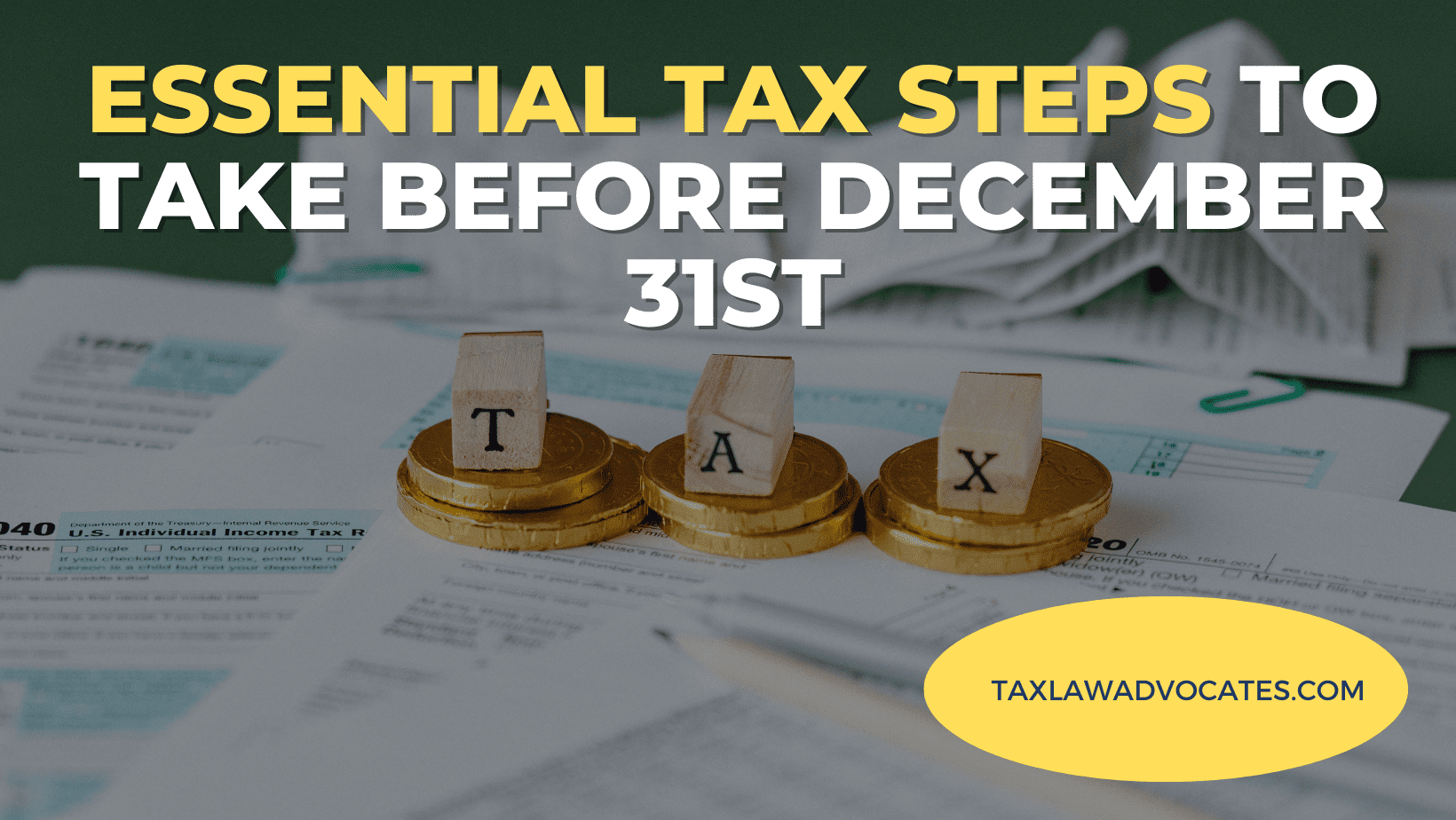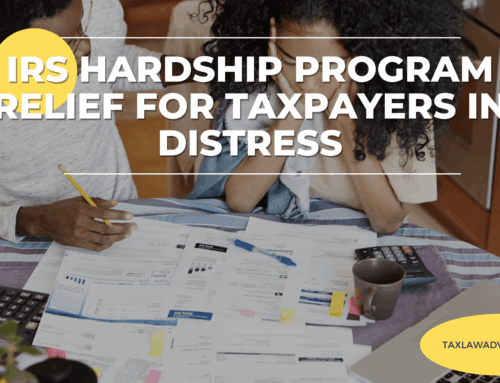As the end of the year approaches, it’s crucial to get your tax affairs in order. December 31st marks a key deadline in tax preparation, and waiting until the last minute could lead to missed opportunities and unnecessary headaches. By following a few essential steps before the year’s end, you can make the process of filing your taxes easier, ensure that you maximize deductions and credits, and avoid delays in receiving your refund. Tax Law Advocates is here to help guide you through this process and ensure that you’re ready for tax season. If you need professional tax assistance, don’t hesitate to contact them at 855-612-7777 or visit their website at taxlawadvocates.com.
Step 1: Organize Your Tax Records
One of the most critical steps to take before December 31st is to organize your tax records. Having accurate and complete documentation will make filing your tax return much smoother. Not only does it help prevent errors that can delay your refund, but it can also help you identify deductions and credits that you might otherwise overlook. You should gather the following key documents:
– Forms W-2 from your employer(s)
– Forms 1099 from banks, freelance work, unemployment compensation, retirement plan distributions, etc.
– Forms 1099-K, 1099-MISC, W-2 if you participated in the gig economy
– Form 1095-A, for those who have Health Insurance Marketplace coverage
– IRS or agency letters such as the CP01A Notice for your Identity Protection PIN
It’s also a good idea to ensure that your personal information, such as your address and Social Security information, is up-to-date with both the IRS and Social Security Administration. This will prevent any hiccups when you file your return.
Step 2: Review Your Income and Taxable Items
Many people don’t realize that most types of income are taxable, including those that may seem minor. Before the year’s end, review all your sources of income to ensure you’re reporting everything that’s taxable. This includes:
– Unemployment income
– Interest received from savings or investments
– Income from side jobs or part-time work in the gig economy
– Income from digital assets, such as cryptocurrency or NFTs
Failing to report income from these sources could lead to penalties or delays in processing your tax return. Tax Law Advocates can help you assess your income and ensure that you’re in compliance with IRS regulations. They’re just a phone call away at 855-612-7777.
Step 3: Consider Adjusting Your Withholding
If you ended up owing taxes or receiving a large refund last year, it may be time to adjust your tax withholding. Adjusting your withholding can help you avoid surprises when you file your tax return in the spring. For example, if you’ve experienced a major life change such as getting married, having a child, or taking on a second job, your tax liability may have shifted. Using tools like the Tax Withholding Estimator available on the IRS website can help you determine if you need to submit a new Form W-4 to your employer. By making these adjustments now, you can ensure that you’re withholding the right amount of tax from your paycheck.
Step 4: Make Estimated Tax Payments
If you earn substantial non-wage income—such as self-employment income, investment income, or taxable Social Security benefits—you may need to make estimated tax payments. These payments are made quarterly, with the final payment for 2023 due in mid-January. Making these payments can help you avoid a large tax bill when you file your return, as well as interest and penalties for underpayment. You can log in to your IRS online account to make a payment or visit IRS.gov/payments.
Step 5: Renew Your ITIN (If Necessary)
For taxpayers who use an Individual Taxpayer Identification Number (ITIN), it’s essential to know whether your ITIN is set to expire. If your ITIN has expired or will expire on December 31, 2023, you should renew it as soon as possible to avoid delays in processing your tax return or receiving your tax credits. You’ll need to renew your ITIN if:
– It was issued before 2013 and hasn’t been used in the last three years.
– It has middle digits of 70 through 88, or 90 through 99 if issued before 2013.
Tax Law Advocates can assist with your ITIN renewal and ensure that your tax return is processed smoothly. Contact them at 855-612-7777 for assistance.
Step 6: Maximize Deductions and Credits
One of the best ways to reduce your tax liability is to take advantage of deductions and credits. Some of the most common tax credits include the Child Tax Credit (CTC), Earned Income Tax Credit (EITC), and the Child and Dependent Care Credit. For the 2023 tax year:
– The CTC is worth $2,000 for each qualifying child under the age of 17.
– Eligible taxpayers with no qualifying children may receive up to $600 through the EITC.
– You may receive up to 35% of your employment expenses through the Child and Dependent Care Credit.
In addition, you may qualify for energy-related credits if you’ve made home energy improvements or purchased an electric vehicle in 2023.
If you plan to itemize your deductions, don’t forget to make charitable contributions before December 31st to claim them on your 2023 return. Donations made via credit card or checks postmarked before the year ends count for the 2023 tax year.
Step 7: Consider Retirement Contributions
Contributing to your retirement accounts is another effective way to reduce your taxable income. Most workplace retirement account contributions should be made by December 31st, but you can make 2023 IRA contributions until the tax filing deadline in April 2024. For 2023, the contribution limits are:
– $22,500 for 401(k) contributions, plus an additional $7,500 for those aged 50 and older
– $6,500 for traditional and Roth IRAs, with an additional $1,000 catch-up contribution for those aged 50 and older
Step 8: File Electronically and Use Direct Deposit
Finally, when it comes time to file your tax return, filing electronically and choosing direct deposit is the fastest and most secure way to get your refund. Direct deposit allows you to receive your refund faster than waiting for a paper check, and it reduces the risk of your refund being lost or stolen.
If you don’t have a bank account, consider opening one before filing your taxes. Prepaid debit cards and mobile apps may also allow direct deposit, but you’ll need to confirm that your provider can supply the correct routing and account numbers.
Get Professional Help from Tax Law Advocates
Preparing for tax season doesn’t have to be overwhelming. By taking these essential steps before December 31st, you can make the filing process smoother, maximize your refund, and avoid costly mistakes. If you’re unsure about your tax situation or need professional assistance, Tax Law Advocates is here to help. Their team of experienced tax professionals can provide personalized advice and representation to ensure that you’re fully prepared for tax season.
Call Tax Law Advocates at 855-612-7777 or visit our website for expert assistance with all your tax preparation needs.






